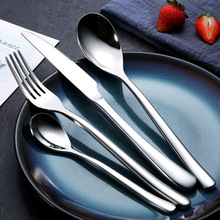
metal cutlery
一、The precautions when using stainless steel cutlery
- It is not allowed to hold salt, soy sauce, vinegar, vegetable soup, etc. for a long time. Because these foods contain a lot of electrolytes, if they are kept for a long time, stainless steel will also react with these electrolytes like other metals to make them harmful. The metal element is dissolved.
- Should not use stainless steel pot Chinese medicine, because Chinese medicine contains a variety of alkaloids, organic acids, and other ingredients, especially under heating conditions, it is difficult to avoid chemical reactions with it, but the drug fails, and even produces some toxicity Large complex.
- Do not wash with strong alkaline or strong oxidizing chemicals such as baking soda, bleaching powder or sodium hypochlorite. Because these materials are strong electrolytes, they also react electrochemically with stainless steel.
- Cannot be empty. Compared with iron products and aluminum products, stainless steel cookware has low thermal conductivity and slow heat transfer time. The air burning will cause aging and falling off of the chrome plating on the surface of the cookware.
- To keep the cookware clean, often scrub, especially after storing vinegar, soy sauce and other condiments should be washed in time to keep the cookware dry.
二、Stainless steel safety issues
Consumers: Many consumers, especially young mothers, pay great attention to food safety. They like to use stainless steel cutlery for their babies. Stainless steel cutlery is not easy to breed bacteria, but many mothers worry that stainless steel utensils are hot and easy to hot, heavy metal. Unqualified stainless steel cutlery can harm your baby’s health and affect your baby’s brain and heart development.
Manufacturer: Mede Cutlery Manufacturer’s manager said that whether the products of the kitchen appliance manufacturer meet the food safety standards depends mainly on whether the manufacturer chooses the materials that meet the standard. Even if it is the same as kitchen supplies, the use criteria are different. The manufacturing process of stainless steel tableware is not cumbersome. After stretching and pressing the sheet, it is necessary to weld, polish and polish it. These links are not harmful to food safety.
Expert: Regardless of how many times the manufacturer has magnified the advantages of stainless steel tableware, its own safety hazard is undeniable. The chief physician of Yantai City Occupational Disease Hospital, Zhan Bo pointed out that although stainless steel is more resistant to rust than other metals, if the public uses improper methods, stainless steel The trace metal elements will also accumulate slowly in the human body, and reaching a certain amount will endanger human health. She said that nickel in stainless steel is a carcinogen, and if it is too much, it will be harmful to the body. However, experts also said that in fact, if the tableware is not corroded and deteriorated, the use of normal life will have little impact on the human body.

